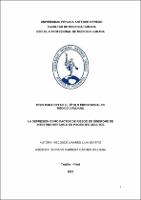| dc.contributor.advisor | Soriano Cabrera, Carmen Giuliana | |
| dc.contributor.author | Vizconde Linares, Lilia Beatriz | |
| dc.creator | Vizconde Linares, Lilia Beatriz | |
| dc.date.accessioned | 2020-03-05T16:50:07Z | |
| dc.date.available | 2020-03-05T16:50:07Z | |
| dc.date.issued | 2020 | |
| dc.identifier.uri | https://hdl.handle.net/20.500.12759/6066 | |
| dc.description.abstract | Identificar si la Depresión es factor de riesgo de Síndrome de
Intestino Irritable en pacientes adultos atendidos en el Hospital Belén de
Trujillo durante el período 2016 a 2018.
Material y Métodos: Se llevó a cabo un estudio de tipo analítico,
observacional, retrospectivo de casos y controles. La población de estudio
estuvo constituida por 216 pacientes según criterios de inclusión y
exclusión establecidos distribuidos en dos grupos: con Síndrome de
Intestino Irritable o sin él, se calculó el odds ratio y la prueba chi cuadrado.
Resultados: La frecuencia de Depresión en pacientes adultos con
Síndrome de Intestino Irritable fue de 21/54= 38%. La frecuencia de
Depresión en pacientes adultos sin Síndrome de Intestino Irritable fue de
34/162= 20%. La Depresión es factor de riesgo para Síndrome de Intestino
Irritable con un odds ratio de 2.39. En el análisis multivariado se verifica la
significancia del riesgo para las variables Depresión, ansiedad, fibromialgia
e insomnio en estudio en relación con la aparición del desenlace Síndrome
de Intestino Irritable.
Conclusiones: La Depresión es factor de riesgo de Síndrome de Intestino
Irritable en pacientes adultos atendidos en el Hospital Belén de Trujillo
durante el período 2016 a 2018. | es_PE |
| dc.description.abstract | To identify if Depression is a risk factor for Irritable Bowel
Syndrome in adult patients treated at Hospital Belén de Trujillo during the
period 2016 to 2018.
Material and Methods: An analytical, observational, retrospective study of
cases and controls was carried out. The study population consisted of 216
patients according to established inclusion and exclusion criteria divided
into two groups: with or without Irritable Bowel Syndrome, the odds ratio and
chi square test were calculated.
Results: The frequency of Depression in adult patients with Irritable Bowel
Syndrome was 21/54 = 38%. The frequency of depression in adult patients
without Irritable Bowel Syndrome was 34/162 = 20%. Depression is a risk
factor for Irritable Bowel Syndrome with an odds ratio of 2.39. In the
multivariate analysis, the significance of the risk for the variables
Depression, anxiety, fibromyalgia and insomnia under study in relation to
the onset of the outcome Irritable Bowel Syndrome is verified.
Conclusions: Depression is a risk factor for Irritable Bowel Syndrome in
adult patients treated at Hospital Belén de Trujillo during the period 2016 to
2018. | en_US |
| dc.description.uri | Tesis | es_PE |
| dc.format | application/pdf | es_PE |
| dc.language.iso | spa | es_PE |
| dc.publisher | Universidad Privada Antenor Orrego | es_PE |
| dc.relation.ispartofseries | T_MED.HUMA_2737 | |
| dc.rights | info:eu-repo/semantics/openAccess | es_PE |
| dc.rights.uri | https://creativecommons.org/licenses/by/4.0/ | es_PE |
| dc.source | Universidad Privada Antenor Orrego | es_PE |
| dc.source | Repositorio Institucional - UPAO | es_PE |
| dc.subject | Depresión | es_PE |
| dc.subject | Factor de riesgo | es_PE |
| dc.title | La depresión como factor de riesgo de síndrome de intestino irritable en pacientes adultos | es_PE |
| dc.type | info:eu-repo/semantics/bachelorThesis | es_PE |
| thesis.degree.level | Título Profesional | es_PE |
| thesis.degree.grantor | Universidad Privada Antenor Orrego. Facultad de Medicina Humana | es_PE |
| thesis.degree.name | Médico Cirujano | es_PE |
| thesis.degree.discipline | Medicina Humana | es_PE |
| dc.subject.ocde | https://purl.org/pe-repo/ocde/ford#3.02.27 | es_PE |
| renati.type | https://purl.org/pe-repo/renati/type#tesis | es_PE |
| renati.level | https://purl.org/pe-repo/renati/level#tituloProfesional | es_PE |
| renati.discipline | 912016 | es_PE |
| dc.publisher.country | PE | es_PE |


